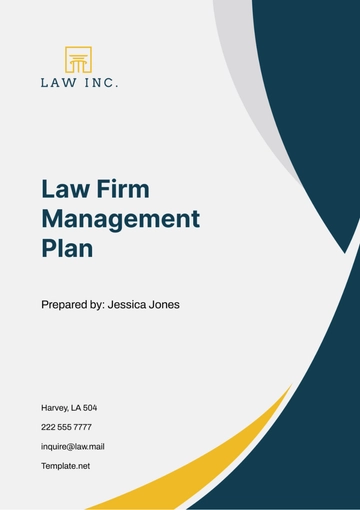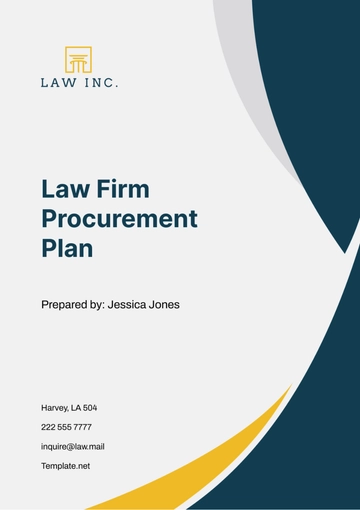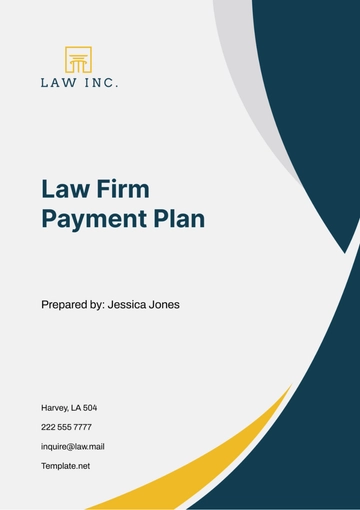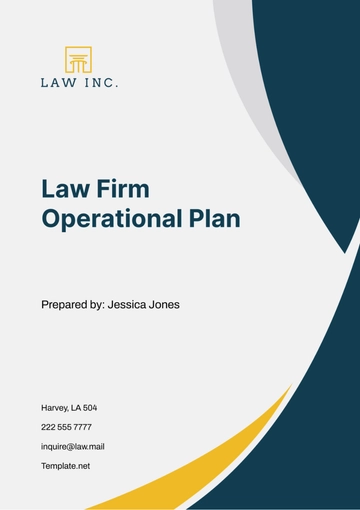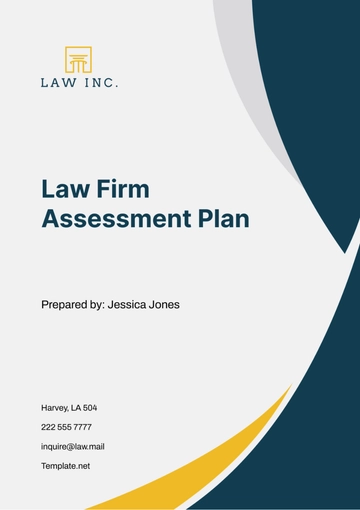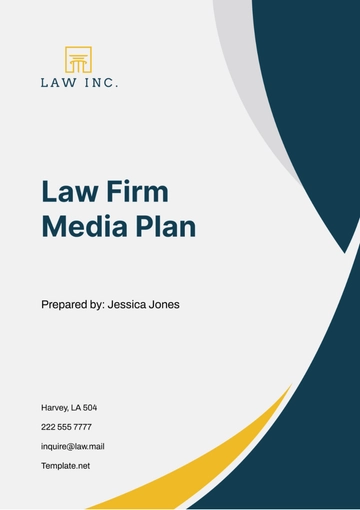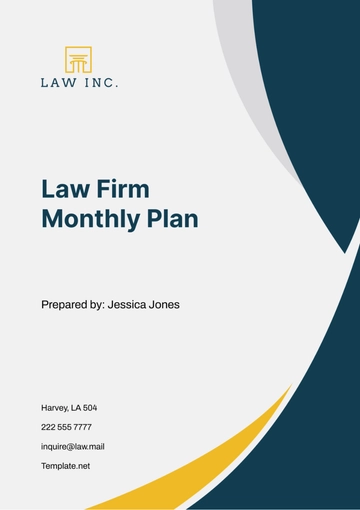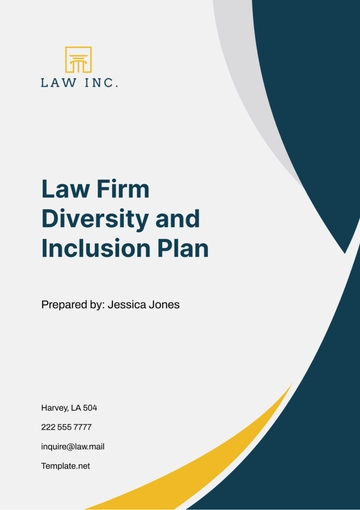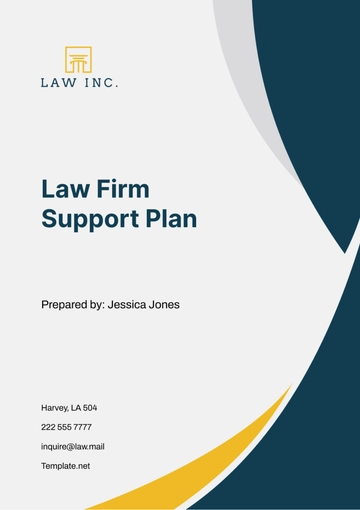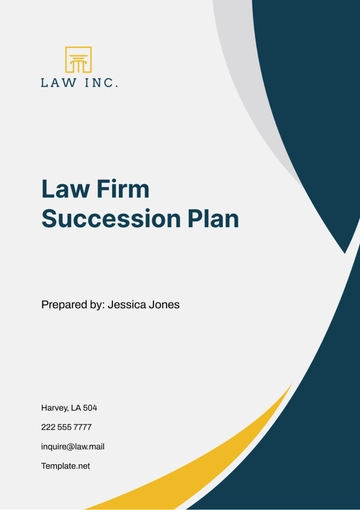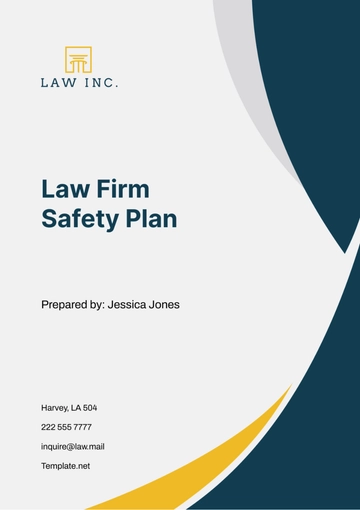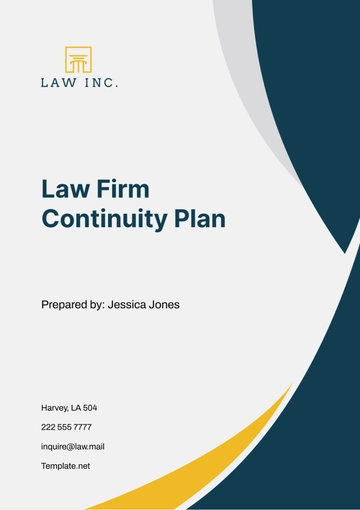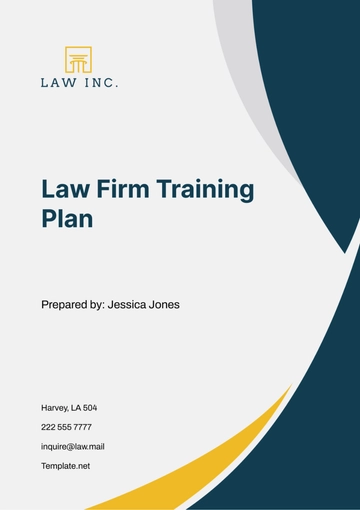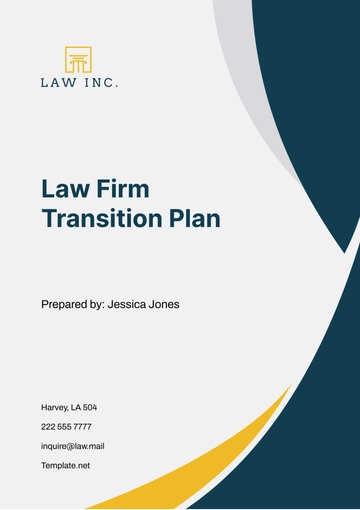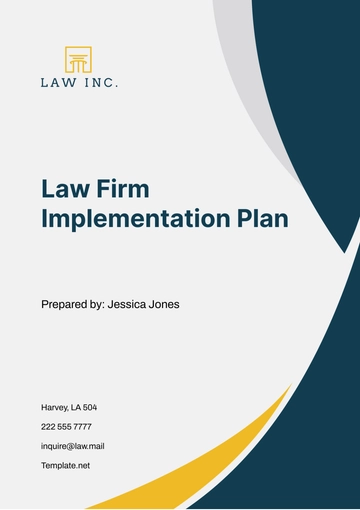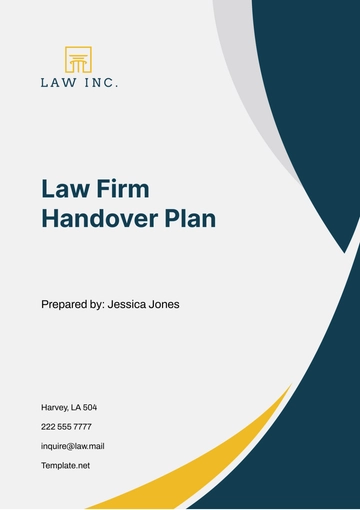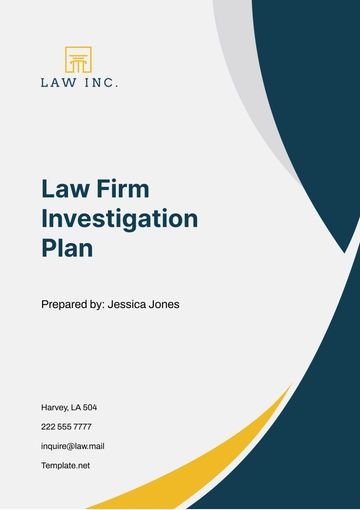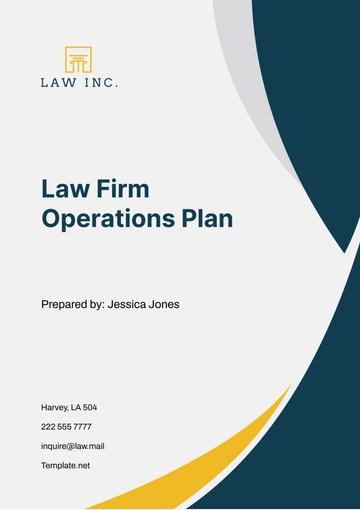Free Law Firm Procurement Plan
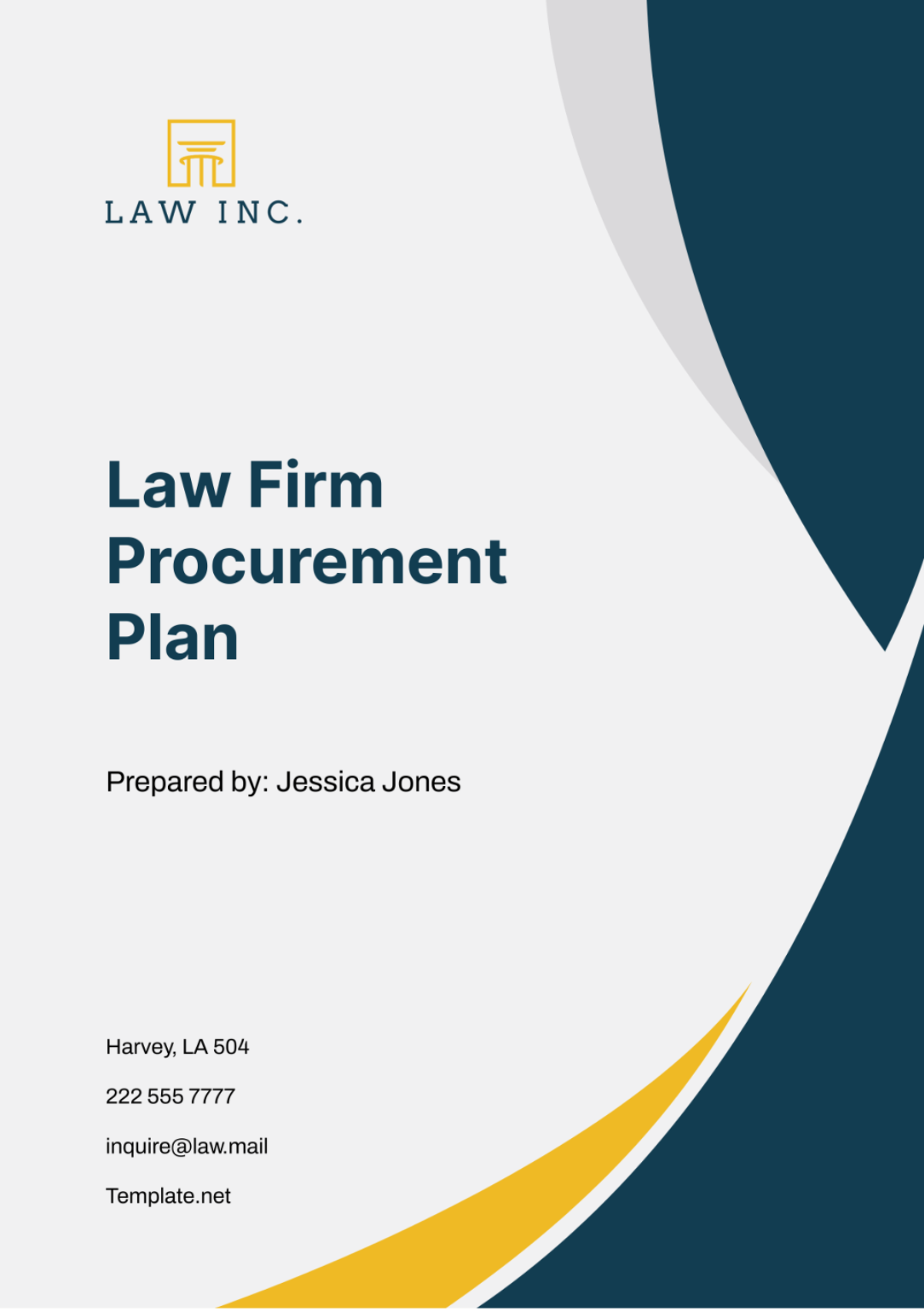
I. Introduction
A. Purpose
The purpose of this Law Firm Procurement Plan is to establish clear guidelines and procedures for the procurement of goods and services necessary for the efficient operation of [Your Company Name] ("the Firm"). By defining a standardized approach to procurement, this plan aims to ensure transparency, accountability, and compliance with applicable laws and regulations.
B. Objectives
The objectives of this Procurement Plan include:
Streamlining the procurement process to minimize delays and inefficiencies.
Ensuring fair and transparent vendor selection processes.
Optimizing costs while maintaining quality standards.
Enhancing vendor relationship management to foster long-term partnerships.
Mitigating procurement-related risks and ensuring business continuity.
C. Scope
This plan applies to all procurement activities conducted by the Firm, including but not limited to:
Office supplies and equipment
Legal research tools and databases
Information technology (IT) hardware and software
Professional services (e.g., consultants, expert witnesses)
Facilities management services
Marketing and promotional materials
II. Procurement Policy
A. Compliance
The Firm is committed to conducting all procurement activities in accordance with applicable laws, regulations, and ethical standards. Key principles guiding procurement compliance include:
Avoiding conflicts of interest: Employees involved in procurement processes must disclose any potential conflicts of interest and recuse themselves from decision-making where necessary.
Fair competition: Procurement processes shall be open and competitive, providing equal opportunities for all qualified vendors.
Confidentiality: Information related to procurement activities, including vendor proposals and pricing, shall be treated with utmost confidentiality to prevent unauthorized disclosure.
Sustainability and diversity: The Firm values sustainability and diversity in its procurement practices, seeking opportunities to engage with vendors who demonstrate commitment to environmental stewardship and diversity and inclusion initiatives.
B. Transparency
Transparency is essential to ensure the integrity of the procurement process and maintain stakeholder trust. To promote transparency, the Firm shall:
Publish procurement policies and procedures: Detailed procurement policies and procedures shall be made available to all employees and vendors to ensure understanding and compliance.
Maintain open communication: Clear and open communication channels shall be established with vendors throughout the procurement process, enabling them to seek clarification and provide feedback.
Document procurement decisions: All procurement decisions, including vendor selection criteria and contract awards, shall be documented to provide a clear audit trail and facilitate accountability.
C. Accountability
Accountability is fundamental to effective procurement management. To enhance accountability, the Firm shall:
Designate a Procurement Officer: A designated Procurement Officer shall be responsible for overseeing all procurement activities, ensuring compliance with policies and procedures, and addressing any issues or concerns raised.
Establish review mechanisms: Regular reviews of procurement processes and outcomes shall be conducted to identify areas for improvement and address any instances of non-compliance.
D. Vendor Management
Effective vendor management is critical to the success of procurement activities. The Firm shall:
Evaluate vendor performance: Vendor performance shall be regularly assessed based on predefined performance metrics, such as quality, timeliness, and customer service.
Foster strategic partnerships: The Firm shall seek to establish strategic partnerships with key vendors to leverage economies of scale, negotiate favorable terms, and drive innovation.
E. Risk Management
Procurement activities entail inherent risks that must be managed effectively to safeguard the Firm's interests. The Firm shall:
Identify procurement risks: Potential risks associated with procurement activities shall be identified and assessed, including risks related to vendor reliability, supply chain disruptions, and regulatory compliance.
Implement risk mitigation measures: Appropriate risk mitigation measures shall be implemented to minimize the likelihood and impact of identified risks, such as diversifying the vendor base, implementing contingency plans, and conducting due diligence on prospective vendors.
III. Procurement Process
A. Need Identification
Departments or individuals requiring goods or services shall submit a procurement request using the standardized Procurement Request Form (PRF). The PRF shall include details such as the specifications, quantity, estimated budget, and justification for the procurement.
B. Vendor Selection
The Procurement Officer shall assess potential vendors based on predefined criteria, including but not limited to:
Quality and suitability of goods or services
Price competitiveness
Vendor reputation and reliability
Compliance with sustainability and diversity requirements
Requests for Quotation (RFQs) or Requests for Proposal (RFPs) shall be issued to selected vendors, outlining the scope of work, evaluation criteria, and submission deadlines.
C. Evaluation and Negotiation
Upon receipt of quotations or proposals, the Procurement Officer shall evaluate each submission based on the specified criteria and select the most suitable vendor(s) for further negotiation.
Negotiations may be conducted with selected vendors to finalize terms and conditions, including pricing, delivery schedules, and service level agreements (SLAs).
D. Contract Award
Contracts shall be awarded to the successful vendor(s) based on a comprehensive evaluation of their proposals and negotiations. The Procurement Officer shall ensure that contracts clearly define the scope of work, deliverables, timelines, payment terms, and any applicable warranties or guarantees.
Contracts shall be reviewed and approved by the appropriate authority before being executed.
E. Contract Management
The Procurement Officer shall oversee the implementation of contracts and monitor vendor performance throughout the contract term. Key activities shall include:
Tracking deliverables and milestones
Addressing any issues or disputes that arise
Conducting periodic performance reviews
Enforcing contract compliance
Any deviations from the agreed-upon terms shall be promptly addressed through contract amendments or corrective actions.
IV. Supplier Relationship Management
A. Performance Monitoring
The Procurement Officer shall conduct periodic reviews of vendor performance to assess adherence to contractual obligations and quality standards. Performance metrics shall include:
Timeliness of deliveries
Quality of goods or services provided
Responsiveness to inquiries and concerns
Feedback from internal stakeholders, such as end-users and department heads, shall also be solicited and considered in vendor assessments.
B. Continuous Improvement
The Firm is committed to continuous improvement in its procurement practices. Lessons learned from past procurements shall be documented and shared to inform future decisions and optimize processes.
The Procurement Officer shall actively seek feedback from stakeholders and vendors to identify areas for improvement and implement best practices.
C. Vendor Diversity and Inclusion
The Firm recognizes the importance of promoting diversity and inclusion in its vendor relationships. Efforts shall be made to engage with vendors from diverse backgrounds, including minority-owned, women-owned, and small businesses.
Supplier diversity goals and initiatives shall be integrated into the procurement process, and progress shall be tracked and reported regularly.
V. Risk Management
A. Risk Identification
The Firm shall conduct comprehensive risk assessments to identify potential risks associated with procurement activities. Key areas of focus shall include:
Vendor reliability: Risks associated with vendor financial stability, reputation, and capacity to deliver goods or services as agreed.
Supply chain disruptions: Risks stemming from factors such as raw material shortages, transportation delays, or geopolitical events that may impact the availability or cost of goods.
Regulatory compliance: Risks related to non-compliance with applicable laws, regulations, and industry standards, such as data privacy regulations or labor laws.
Contractual risks: Risks arising from poorly defined or ambiguous contract terms, including scope creep, pricing disputes, and intellectual property rights.
Risk assessments shall be conducted periodically and updated as needed to account for changing business conditions and external factors.
B. Mitigation Strategies
Once risks have been identified, the Firm shall develop and implement appropriate mitigation strategies to minimize their impact. Mitigation measures may include:
Diversifying the vendor base: Engaging with multiple vendors for critical goods or services to reduce reliance on a single supplier and mitigate supply chain disruptions.
Establishing contingency plans: Developing contingency plans to address potential disruptions, such as identifying alternative suppliers or implementing backup systems.
Conducting due diligence: Performing thorough due diligence on prospective vendors to assess their financial stability, reputation, and compliance history before entering into contracts.
Enhancing contract management: Strengthening contract management processes to ensure clear and enforceable contract terms, including robust dispute resolution mechanisms and performance incentives.
The effectiveness of risk mitigation strategies shall be regularly reviewed and updated as necessary to address emerging risks and changing business needs.
VI. Budget and Reporting
A. Budget Allocation
The Finance Department shall allocate budgets for procurement activities based on departmental needs, strategic priorities, and available financial resources. Budget allocations shall be reviewed and approved by senior management to ensure alignment with overall business objectives.
Budgetary controls shall be implemented to monitor expenditures and prevent overspending. Any deviations from approved budgets shall be documented and justified in accordance with established procedures.
B. Reporting
The Procurement Officer shall prepare regular reports on procurement activities to provide visibility into spending, performance, and compliance with policies and procedures. Key elements of procurement reports may include:
Summary of procurement activities: Overview of procurement requests received, contracts awarded, and expenditures incurred during the reporting period.
Savings achieved: Analysis of cost savings realized through strategic sourcing, negotiations, and vendor management initiatives.
Vendor performance: Evaluation of vendor performance against predefined metrics, including adherence to quality standards, timeliness of deliveries, and responsiveness to inquiries and concerns.
Compliance status: Assessment of compliance with procurement policies, regulations, and ethical standards, including any instances of non-compliance and corrective actions taken.
Procurement reports shall be shared with senior management, department heads, and other relevant stakeholders to support decision-making, promote transparency, and facilitate accountability.
VII. Training and Awareness
A. Training Programs
[Your Company Name] is committed to providing comprehensive training programs to ensure that employees involved in procurement activities are equipped with the necessary knowledge and skills to perform their roles effectively. Training topics may include:
Procurement policies and procedures: Overview of [Your Company Name]'s procurement policies, including ethical standards, compliance requirements, and best practices.
Vendor selection and evaluation: Guidance on selecting and evaluating vendors based on predefined criteria, including quality, price, and reliability.
Contract management: Best practices for contract negotiation, implementation, and monitoring to ensure compliance with contractual obligations and optimize vendor performance.
Risk management: Strategies for identifying, assessing, and mitigating risks associated with procurement activities, including supply chain disruptions, regulatory compliance, and contractual risks.
Training sessions shall be conducted regularly and tailored to the specific needs of different departments and job roles within the Firm. Participation in training programs may be mandatory for employees involved in procurement activities or recommended for other staff members as deemed appropriate.
B. Awareness Campaigns
In addition to formal training programs, [Your Company Name] shall launch awareness campaigns to promote a culture of compliance, transparency, and accountability in procurement activities. Awareness campaigns may include:
Communication materials: Development of posters, brochures, and other visual aids to communicate key procurement policies, procedures, and compliance requirements to employees.
Email newsletters: Regular distribution of email newsletters highlighting procurement updates, success stories, and reminders of key deadlines or requirements.
Webinars and seminars: Hosting webinars and seminars featuring guest speakers, case studies, and interactive discussions on procurement-related topics to engage employees and foster knowledge-sharing.
Recognition programs: Recognition programs to acknowledge and reward employees who demonstrate exemplary adherence to procurement policies and contribute to achieving procurement objectives.
Awareness campaigns shall be ongoing and integrated into the Firm's broader communication and training initiatives to ensure maximum reach and impact.
VIII. Conclusion
A. Review and Revision
This Law Firm Procurement Plan shall be subject to periodic review and revision to ensure its continued relevance, effectiveness, and alignment with [Your Company Name]'s strategic objectives and evolving business needs.
Reviews shall be conducted by the Procurement Officer in consultation with key stakeholders, including department heads, legal counsel, and senior management. Feedback from employees and external parties, such as vendors and regulatory authorities, shall also be solicited and considered in the review process.
B. Amendments and Updates
Any amendments or updates to this Procurement Plan shall be documented and communicated to all relevant stakeholders in a timely manner. Changes may be communicated through email notifications, staff meetings, or updates to the Firm's intranet or procurement portal.
Training sessions or refresher courses may be conducted to ensure that employees are aware of and understand any changes to procurement policies, procedures, or requirements.
By adhering to the provisions outlined in this Law Firm Procurement Plan, [Your Company Name] aims to enhance transparency, accountability, and efficiency in its procurement processes, thereby supporting its mission of delivering exceptional legal services to clients while upholding the highest standards of integrity and professionalism.
- 100% Customizable, free editor
- Access 1 Million+ Templates, photo’s & graphics
- Download or share as a template
- Click and replace photos, graphics, text, backgrounds
- Resize, crop, AI write & more
- Access advanced editor
Optimize your firm's procurement process with Template.net's Law Firm Procurement Plan Template. This editable and customizable document outlines a strategic framework for sourcing goods and services efficiently. Crafted by legal and procurement experts, it ensures clarity and professionalism in procurement activities. Editable in our Ai Editor Tool for seamless customization and integration into your firm's procurement strategy.
You may also like
- Finance Plan
- Construction Plan
- Sales Plan
- Development Plan
- Career Plan
- Budget Plan
- HR Plan
- Education Plan
- Transition Plan
- Work Plan
- Training Plan
- Communication Plan
- Operation Plan
- Health And Safety Plan
- Strategy Plan
- Professional Development Plan
- Advertising Plan
- Risk Management Plan
- Restaurant Plan
- School Plan
- Nursing Home Patient Care Plan
- Nursing Care Plan
- Plan Event
- Startup Plan
- Social Media Plan
- Staffing Plan
- Annual Plan
- Content Plan
- Payment Plan
- Implementation Plan
- Hotel Plan
- Workout Plan
- Accounting Plan
- Campaign Plan
- Essay Plan
- 30 60 90 Day Plan
- Research Plan
- Recruitment Plan
- 90 Day Plan
- Quarterly Plan
- Emergency Plan
- 5 Year Plan
- Gym Plan
- Personal Plan
- IT and Software Plan
- Treatment Plan
- Real Estate Plan
- Law Firm Plan
- Healthcare Plan
- Improvement Plan
- Media Plan
- 5 Year Business Plan
- Learning Plan
- Marketing Campaign Plan
- Travel Agency Plan
- Cleaning Services Plan
- Interior Design Plan
- Performance Plan
- PR Plan
- Birth Plan
- Life Plan
- SEO Plan
- Disaster Recovery Plan
- Continuity Plan
- Launch Plan
- Legal Plan
- Behavior Plan
- Performance Improvement Plan
- Salon Plan
- Security Plan
- Security Management Plan
- Employee Development Plan
- Quality Plan
- Service Improvement Plan
- Growth Plan
- Incident Response Plan
- Basketball Plan
- Emergency Action Plan
- Product Launch Plan
- Spa Plan
- Employee Training Plan
- Data Analysis Plan
- Employee Action Plan
- Territory Plan
- Audit Plan
- Classroom Plan
- Activity Plan
- Parenting Plan
- Care Plan
- Project Execution Plan
- Exercise Plan
- Internship Plan
- Software Development Plan
- Continuous Improvement Plan
- Leave Plan
- 90 Day Sales Plan
- Advertising Agency Plan
- Employee Transition Plan
- Smart Action Plan
- Workplace Safety Plan
- Behavior Change Plan
- Contingency Plan
- Continuity of Operations Plan
- Health Plan
- Quality Control Plan
- Self Plan
- Sports Development Plan
- Change Management Plan
- Ecommerce Plan
- Personal Financial Plan
- Process Improvement Plan
- 30-60-90 Day Sales Plan
- Crisis Management Plan
- Engagement Plan
- Execution Plan
- Pandemic Plan
- Quality Assurance Plan
- Service Continuity Plan
- Agile Project Plan
- Fundraising Plan
- Job Transition Plan
- Asset Maintenance Plan
- Maintenance Plan
- Software Test Plan
- Staff Training and Development Plan
- 3 Year Plan
- Brand Activation Plan
- Release Plan
- Resource Plan
- Risk Mitigation Plan
- Teacher Plan
- 30 60 90 Day Plan for New Manager
- Food Safety Plan
- Food Truck Plan
- Hiring Plan
- Quality Management Plan
- Wellness Plan
- Behavior Intervention Plan
- Bonus Plan
- Investment Plan
- Maternity Leave Plan
- Pandemic Response Plan
- Succession Planning
- Coaching Plan
- Configuration Management Plan
- Remote Work Plan
- Self Care Plan
- Teaching Plan
- 100-Day Plan
- HACCP Plan
- Student Plan
- Sustainability Plan
- 30 60 90 Day Plan for Interview
- Access Plan
- Site Specific Safety Plan

